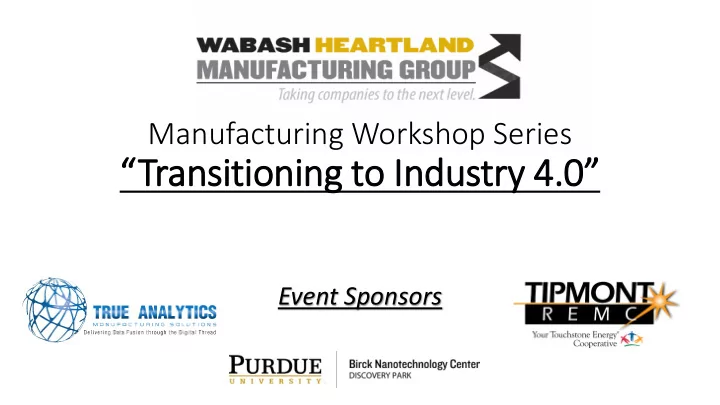

Manufacturing Workshop Series “Transitioning t to Industry 4 y 4.0” Event Sponsors
Welcome and Introduction Wabash Heartland Manufacturing Group Workshop Series. By Ted Fiock Purdue WHIN Managing Director “Transitioning to Industry 4.0” August 28, 2019
Justification for New Technology Transformations in your operations. By Steve Dunlop Managing Director of DCMME and GSCMI Dr. Jan-Anders Mansson Distinguished Professor of Materials & Chemical Engineering and Co-Director of InMaC “Transitioning to Industry 4.0” August 28, 2019
Return on Investment (ROI) is a calculation of the most tangible financial gains or benefits that can be expected from a project versus the costs for implementing the suggested program or solution. (tangible financial benefits relative to costs of investment) Cost Benefit Analysis (CBA) is more comprehensive than ROI , and attempts to quantify both tangible and intangible (or “soft”) costs and benefits . Value on Investment (VOI) , is defined as “intangible assets that contribute heavily to an organization’s performance. Value on Investment refers to the overall value received on any given financial investment . Basically, VOI includes the financial return, but also takes into account more abstract value that was received from that investment .
Benefits Potential Tangible Intangible • • Headcount Re-allocation Customer Experience • Lower Customer Turnover Rates • Hiring Avoidance For New • Increased Revenue Opportunities Processes • Faster Time To Market • Productivity Returned • Compliance and Security To Line-of-Business • Fraud Reduction • • Industry Regulation Compliance Recruiting, Training, Facilities Cost Avoidance • Flexibility • • Replace/Supplement Traditional IT Lifecycle Process Metrics • Leverage Existing Infrastructure • Increased Revenue • Intermediary Processes • Data Quality • Employee Satisfaction
Justification for New Technology Transformations in your operations. Questions and Answers “Transitioning to Industry 4.0” August 28, 2019
How to create and sustain organizational change Benjamin B. Dunford, Ph.D. 7
8
Lewin’s 3 Step Change Process Helping Helping Institutionalizing Organizational employees be employees new patterns of Level dissatisfied with behavior actually alter their status quo patterns of behavior Unfreeze Change Refreeze Individual Being unhealthy Change eating New behaviors Level is unacceptable behavior become routine
Organization Development Interventions Coaching Team Training Building 3 rd Party Dispute Resolution 360° Feedback Physical Facilities
Coaching Team Training What if we Building 3 rd Party can’t do all Dispute Resolution 360° Feedback of this? Physical Facilities
4 Critical OD Interventions Unfreeze Move Refreeze Contracting Personal Team Confrontation and Action Management Building Meetings Planning Interview Often Combined Into 1 meeting Called “Team Building”
So what? Does it work? Evidence
Patient Satisfaction – Percentile 96.0% 100% 85.5% 85.6% 84.7% 85.0% 84.0% 90% 80% 70% 60% 46.0% 50% 40% 30% 20% 10% 0% 2000 2001 2002 2003 2004 2005 2006
Turnover Rate- Nursing 30% 24.10% 25% 20% 15% 10% 7.80% 7.40% 7.00% 6.00% 4.60% 4.08% 5% 0% 2000 2001 2002 2003 2004 2005 2006
Profitability Profitability – Total Margin Return on Equity 8% 10% 8.66% 8.91% 6.84% 8.61% 8.41% 9% 7% 7.98% 6.31% 6.29% 6.09% 8% 5.60% 6% 7% 6.06% 6% 5% 5% 4.27% 4.13% 4% 4% 3% 2.96% 2% 3% 1% 2% 0% 2000 2001 2002 2003 2004 2005 2006 2000 2001 2002 2003 2004 2005 2006
Frankfort Campus Change Management 17
Managing Change for 4.0 Transformation Questions and Answers “Transitioning to Industry 4.0” August 28, 2019
Recommend
More recommend